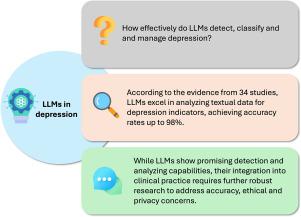探索大语言模型对抑郁症的疗效和潜力:系统综述。
IF 4.9
2区 医学
Q1 CLINICAL NEUROLOGY
引用次数: 0
摘要
背景和目的:抑郁症是一个严重的公共卫生问题,具有全球性影响。虽然最初的文献综述探讨了人工智能(AI)与心理健康之间的交叉点,但尚未对大型语言模型(LLM)在这一领域的具体贡献进行批判性评估。本系统综述的目的是研究大型语言模型在诊断和管理抑郁症方面的实用性,以及将其纳入临床实践的情况:本综述基于对 2018 年 1 月至 2024 年 3 月期间的 PubMed、Embase、Web of Science 和 Scopus 数据库的全面检索。检索使用了 PROSPERO 并遵守了 PRISMA 指南。纳入了原创研究文章、预印本和会议论文,排除了非英文和非研究性出版物。对数据提取进行了标准化处理,并使用 ROBINS-I、QUADAS-2 和 PROBAST 工具对偏倚风险进行了评估:我们的综述包括 34 项研究,这些研究侧重于应用 LLM 通过临床数据和社交媒体文本对抑郁症进行检测和分类。RoBERTa和BERT等LLM显示出了很高的有效性,尤其是在早期检测和症状分类方面。尽管如此,将 LLMs 融入临床实践仍处于初级阶段,有关数据隐私和伦理影响的问题一直备受关注:结论:LLMs 在改变抑郁症诊断和治疗策略方面具有巨大潜力。尽管如此,要将 LLMs 全面应用于临床实践,还需要进行严格的测试、考虑伦理因素并加强隐私保护措施,以确保其使用的安全性和有效性。本文章由计算机程序翻译,如有差异,请以英文原文为准。

Exploring the efficacy and potential of large language models for depression: A systematic review
Background and objective
Depression is a substantial public health issue, with global ramifications. While initial literature reviews explored the intersection between artificial intelligence (AI) and mental health, they have not yet critically assessed the specific contributions of Large Language Models (LLMs) in this domain. The objective of this systematic review was to examine the usefulness of LLMs in diagnosing and managing depression, as well as to investigate their incorporation into clinical practice.
Methods
This review was based on a thorough search of the PubMed, Embase, Web of Science, and Scopus databases for the period January 2018 through March 2024. The search used PROSPERO and adhered to PRISMA guidelines. Original research articles, preprints, and conference papers were included, while non-English and non-research publications were excluded. Data extraction was standardized, and the risk of bias was evaluated using the ROBINS-I, QUADAS-2, and PROBAST tools.
Results
Our review included 34 studies that focused on the application of LLMs in detecting and classifying depression through clinical data and social media texts. LLMs such as RoBERTa and BERT demonstrated high effectiveness, particularly in early detection and symptom classification. Nevertheless, the integration of LLMs into clinical practice is in its nascent stage, with ongoing concerns about data privacy and ethical implications.
Conclusion
LLMs exhibit significant potential for transforming strategies for diagnosing and treating depression. Nonetheless, full integration of LLMs into clinical practice requires rigorous testing, ethical considerations, and enhanced privacy measures to ensure their safe and effective use.
求助全文
通过发布文献求助,成功后即可免费获取论文全文。
去求助
来源期刊

Journal of affective disorders
医学-精神病学
CiteScore
10.90
自引率
6.10%
发文量
1319
审稿时长
9.3 weeks
期刊介绍:
The Journal of Affective Disorders publishes papers concerned with affective disorders in the widest sense: depression, mania, mood spectrum, emotions and personality, anxiety and stress. It is interdisciplinary and aims to bring together different approaches for a diverse readership. Top quality papers will be accepted dealing with any aspect of affective disorders, including neuroimaging, cognitive neurosciences, genetics, molecular biology, experimental and clinical neurosciences, pharmacology, neuroimmunoendocrinology, intervention and treatment trials.
 求助内容:
求助内容: 应助结果提醒方式:
应助结果提醒方式:


